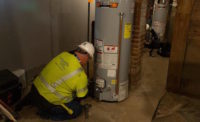The National Transportation Safety Board has issued urgent safety recommendations in the wake of September’s natural-gas explosions and fires in the Merrimack Valley area of Massachusetts that killed one person and resulted in at least 21 others, including two firefighters, going to the hospital.
The NTSB safety recommendation report, which the board released on Nov. 15, says that the explosions occurred when high-pressure gas was released into a low-pressure distribution system at a site in South Lawrence, Mass., after a section of line was replaced.
A crew contracted by Columbia Gas of Massachusetts, the system owner and operator, was installing a new plastic distribution main and leaving in place the existing cast-iron distribution main, the NTSB report said. The cast-iron main still had its regulator-sensing lines that provided information to the regulator devices to control pressure.
According to NTSB, pressure dropped in the section with the regulator-sensing lines when the old main was disconnected. That caused the regulators to open further, raising pressure in the system. That let high-pressure gas flow into the system at levels far above the maximum allowed, leading to the fires and explosions.
Columbia Gas replaced nearly 45-miles of damaged pipeline in the area three weeks early but says it will until Dec. 19 to fully restore gas service to residents and businesses.
Recommendation for state
NTSB is recommending that the state government eliminate the professional engineer licensure exemption for public-utility work and for a professional engineer’s seal on engineering drawings for such work.
In its report, the safety board states, “The NTSB believes that it is critical that an engineer with the appropriate qualifications and experience review engineering plans for a gas company, if not develop them.”
It adds, “The seal of a P.E. should be required on all public utility engineering plans to reduce the likelihood of accidents such as this occurring.”
Katie Gronendyke, press secretary to the Massachusetts Executive Office of Energy and Environmental Affairs, said in an emailed statement that the state’s Dept. of Public Utilities “is in the process of reviewing the recommendations and will work with the Legislature to fully comply with the NTSB safety recommendations.”
Recommendations for company
The safety board also issued four recommendations to NiSource Inc., the parent company of Columbia Gas of Massachusetts.
They include changing the company’s engineering plan and constructability-review process throughout all of its subsidiaries to make sure that all relevant NiSource departments check construction documents for accuracy, completeness and correctness, and that they get a professional engineer’s seal before work begins.
In addition, NTSB calls for the company to review all of its natural-gas systems’ records and documentation to make sure that they “are traceable, reliable and complete.”
The safety board also says NiSource should manage the process for changes in its gas line network to identify threats to the system that could lead to a “common mode failure.”
Moreover, NTSB recommends that the company develop and implement control procedures while gas mains are being modified during its management-of-change operations.
That would include continual monitoring of gas-main pressures during the modifications and having workers in place at key points to shut down the system immediately if the company detects “abnormal operations,” it says.
NiSource said in a statement, “We are thoroughly reviewing the safety recommendations…and look forward to discussing them in further detail with NTSB. We will continue to work with NTSB as it works toward issuing its final conclusions.”
NiSource, State Take Actions
NiSource also said it is taking steps to improve safety and guard against over-pressurization. For example, it plans a $150-million program to install over-pressurization protection equipment on all of its low-pressure gas systems. It said the devices would shut down gas flow when they detect pressure that is too high or too low.
The company also said it has done a field survey of its regulator stations and begun an engineering review of the stations. In addition, it is verifying and improving its maps and records of the regulator stations and has “initiated a process” for NiSource workers to be on site when excavation is done close to the stations.
On Oct. 12, the Dept. of Public Utilities put a moratorium on all work except for emergency and compliance activity, in the Columbia Gas service area until at least Dec. 1.
The department also said on Nov. 1 it had picked Dynamic Risk Assessment Systems Inc. to do a statewide study of the natural gas distribution system
The safety board’s authority is limited to investigating accidents, determining probable causes and issuing recommendations. It cannot promulgate regulations or impose penalties.
It could take about a year for NTSB to produce its full report on the accident and determine a probable cause. But, as in this case, earlier in its investigations the safety board sometimes issues urgent recommendations for safety-related actions if it feels such steps are warranted.






Post a comment to this article
Report Abusive Comment